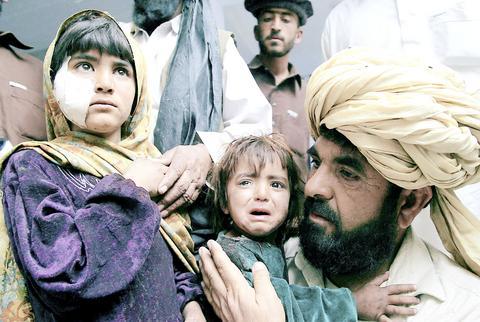Pakistani troops yesterday resumed their pounding of tribesmen and al-Qaeda militants in rural mud fortresses where they believe they have al-Qaeda No. 2 Ayman al-Zawahri trapped, while interrogators began grilling some of the 40 suspects captured in the raid for clues about the terror leader's whereabouts.
The fighting -- including thunderous artillery and swooping assaults by Cobra attack helicopters -- has forced an exodus of thousands of terrified civilians, who have poured out of the battle zone deep in South Waziristan. Many have taken refuge in Wana, the main town in the tribal zone, but there were indications the battle was following close on their heels.

PHOTO: AP
Loud explosions and gunfire could be heard early yesterday in Gangikhel village, a hamlet of simple mud dwellings just 5km west of Wana. Previous fighting in Kaloosha, Azam Warsak and Shin Warsak was about twice that distance from Wana, close to the border with Afghanistan.
"The operation is on," army spokesman Major-General Shaukat Sultan said yesterday.
Brigadier Mahmood Shah, the chief of security for tribal areas in northwestern Pakistan, said that some 40 suspects have been arrested in the operation, which began Tuesday, and some of the prisoners have been taken for interrogation to the provincial capital, Peshawar.
Security officials said the men included Pakistanis, Arabs, Chechens, Uzbeks and ethnic Uighurs from China's predominantly Muslim Xinjiang province, where a separatist movement is simmering. No senior al-Qaeda leaders were believed to be among them, but authorities hoped they would provide a better picture of the terrorists' heavily fortified lair.
There have been reports that at least 80 ethnic Uzbek Islamic militants, led by Qari Tahir Yaldash, a Taliban ally and deputy of slain Uzbek leader Juma Namangani, are in the Waziristan region. Namangani was killed during the US-led coalition's assault on Afghanistan that began in late 2001.
"Our people are interrogating them to determine who these terrorists are," Shah said.
"Some of them are foreigners," Shah said.
Up to 400 militants are believed holed up in the heavily fortified compounds, Sultan said Friday.
Fighting stopped in the evening on Friday but late in the night the troops began firing artillery guns, an intelligence official in Wana said on the condition of anonymity. Sultan said the Pakistani forces were joined by "a dozen or so" US intelligence agents in the ongoing operation. US satellites, Predator drones and other surveillance equipment hovered overhead.
Sultan put the number of troops killed in the operation at 17, most in a disastrous initial assault on Tuesday. But other military and intelligence officials said many more had died in the heaviest fighting on Thursday and Friday, and about a dozen soldiers are missing and feared taken hostage.
Shah said the fierce fighting, heavy fortifications and other intelligence led authorities to believe al-Zawahri might be among the militants. He said authorities had gotten "one or two reports" that the al-Qaeda No. 2 had been in the area in the recent past.
An Afghan intelligence official with connections in Pakistan's tribal region also said that al-Zawarhi was believed in the area of the Pakistan operation, in South Waziristan.

PRECARIOUS RELATIONS: Commentators in Saudi Arabia accuse the UAE of growing too bold, backing forces at odds with Saudi interests in various conflicts A Saudi Arabian media campaign targeting the United Arab Emirates (UAE) has deepened the Gulf’s worst row in years, stoking fears of a damaging fall-out in the financial heart of the Middle East. Fiery accusations of rights abuses and betrayal have circulated for weeks in state-run and social media after a brief conflict in Yemen, where Saudi airstrikes quelled an offensive by UAE-backed separatists. The United Arab Emirates is “investing in chaos and supporting secessionists” from Libya to Yemen and the Horn of Africa, Saudi Arabia’s al-Ekhbariya TV charged in a report this week. Such invective has been unheard of

US President Donald Trump on Saturday warned Canada that if it concludes a trade deal with China, he would impose a 100 percent tariff on all goods coming over the border. Relations between the US and its northern neighbor have been rocky since Trump returned to the White House a year ago, with spats over trade and Canadian Prime Minister Mark Carney decrying a “rupture” in the US-led global order. During a visit to Beijing earlier this month, Carney hailed a “new strategic partnership” with China that resulted in a “preliminary, but landmark trade agreement” to reduce tariffs — but

Chinese President Xi Jinping’s (習近平) purge of his most senior general is driven by his effort to both secure “total control” of his military and root out corruption, US Ambassador to China David Perdue said told Bloomberg Television yesterday. The probe into Zhang Youxia (張又俠), Xi’s second-in-command, announced over the weekend, is a “major development,” Perdue said, citing the family connections the vice chair of China’s apex military commission has with Xi. Chinese authorities said Zhang was being investigated for suspected serious discipline and law violations, without disclosing further details. “I take him at his word that there’s a corruption effort under

China executed 11 people linked to Myanmar criminal gangs, including “key members” of telecom scam operations, state media reported yesterday, as Beijing toughens its response to the sprawling, transnational industry. Fraud compounds where scammers lure Internet users into fake romantic relationships and cryptocurrency investments have flourished across Southeast Asia, including in Myanmar. Initially largely targeting Chinese speakers, the criminal groups behind the compounds have expanded operations into multiple languages to steal from victims around the world. Those conducting the scams are sometimes willing con artists, and other times trafficked foreign nationals forced to work. In the past few years, Beijing has stepped up cooperation